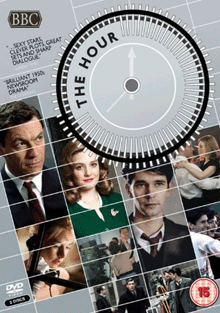 Journalists bribe police; phones are bugged; there’s an uneasy tension between Whitehall and the BBC, and a day of peaceful protest is soured by violence. In other reviews, this would be an opportunity to go for a reverse-switch punchline and clarify that, no, we’re not talking about 2011: it’s 1956 and the world of The Hour.
Journalists bribe police; phones are bugged; there’s an uneasy tension between Whitehall and the BBC, and a day of peaceful protest is soured by violence. In other reviews, this would be an opportunity to go for a reverse-switch punchline and clarify that, no, we’re not talking about 2011: it’s 1956 and the world of The Hour.
But BBC Two’s recent six-part series is so sophisticated and intelligent a drama, it deserves more than the obvious gags. If you make a drama well – and this is made exceptionally well – then of course it will find its resonances. Women battering against the glass ceiling; civil servants threatened with exposure of their homosexuality… The dresses may be A-line, but the complexities and subtleties of people’s relationships are observed with a truthfulness that never dates.
This is so immersive a world for the viewer that, after only one episode, we longed to put on a v-neck sweater, grease our hair, and smoke an awful lot of cigarettes while berating career girls for looking really piggy when they’re lying.
In The Hour, everyone smokes. A lot. But then, perhaps you’d need the odd nicotine rush too if you were convinced your country was on the brink of a third world war.
The twin horrors of the Suez Crisis and the Hungarian Uprising haunt the characters in this drama – the bright young things of the BBC’s new current affairs unit, who must battle against Establishment interference, the 14 day gagging rule and their own romantic feelings to create a new style of investigative journalism on television. Once again, the contemporary parallels are striking. There cannot be anyone watching for whom the idea of a government taking its country into an unpopular and ethically-disputed war isn’t a pertinent one.
But alongside the contemporary social commentary, there is beautiful period evocation. The attention to detail is exquisite: the screen awash with oranges, browns and greys. Production designer, Eve Stewart – formerly of Vera Drake and The King’s Speech – rightly gets acclaim on the ‘Behind the Scenes’ feature.
But it’s writer Abi Morgan who should take perhaps the greatest credit for defining a moment in Britain when brittle social deference was giving way to a new spirit of iconoclasm. Occasionally, one hears what sounds like the odd anachronism – did people really say ‘Note to self’ in 1956? But maybe they did. The quality of the research is so good, we wouldn’t want to bet against it.
At heart, this is a thrilling spy story which plays with the sort of material that would happily grace a John Buchan, Ian Fleming or John Le Carré novel. It’s a world of rainy back streets and smoky jazz clubs, peopled by the sorts of actors who are incapable of giving a bad performance: Juliet Stevenson, Anna Chancellor, Jason Watkins, Jessica Hynes, Andrew Scott…
If Anton Lesser, Tim Piggot-Smith and Ben Whishaw, so powerful in the final episode, don’t all get BAFTA nods next year, we’d be surprised. But The Hour has time to nurture newer talents too, such as Lisa Greenwood, embodying the spirit of young London as Sissy, and Joshua McGuire, channelling a cross between Harry Secombe and Bernard Levin as Isaac.
It’s a truism to say that the BBC does this sort of thing terribly well – as if, somehow, intelligent scripting, beautiful design and emotive acting are not hard won, but an accident of a W12 postcode. Even so, the BBC does do this sort of thing terribly well – and we shouldn’t forget it. It’s not just in 1956 that the Powers That Be consider the BBC a political nuisance that needs to be brought to heel through budget cuts. It is an organisation which remains constantly under threat from internal bureaucracy, external political scrutiny, and, occasionally from programme makers, the belief that ‘this will do’.
The Hour never settles for ‘this will do’. Buy it. Watch it. Love it. And hope that somehow they manage to reassemble this remarkable cast and crew for a second series.
![]()
Extras: Alongside all six episodes, you’ll find two documentaries on the two discs: a behind the scenes feature which is notable for giving an engaging Anna Chancellor the chance to guide the viewer through the set, and a documentary on the making of the drama, which takes time to interview the leading figures in front of and behind the camera. A word of warning, however: even though this documentary is placed on the first disc alongside the first three episodes, if you haven’t watched all six episodes, leave it until last as it heavily profiles a crucial scene in the final episode.
![]()
Released on DVD on Monday 29th August 2011 by 2entertain.
Watch the trailer…

